6 HR Challenges to Managing Remote Teams—and How to Avoid Them

6 Remote Work Challenges for HR
This blog article focuses on 6 challenges HR faces in managing remote teams. To learn even more, please download the HR Cloud eBook, “A Better Way to Communicate, Engage, and Recognize and Reward Remote Teams” today.
Even before the coronavirus and its work-at-home mandate, remote work was an accepted best practice. Research showed that approximately 60% of employees were working remotely and a full 30% were fully remote. The COVID-19 crisis has pushed these numbers even higher and not just for the short term: early feedback shows that many employees hope to keep working from home in the “new normal.”
Yet many companies continue to use traditional management methods—those designed for office and on-site workers—that are not as effective as they should be for a remote workforce. Such an approach leaves employees feeling disconnected, creates HR inefficiencies, and can even have an adverse effect on the business itself.
Let’s take a closer look at six challenges most HR teams face when attempting to manage remote teams.
#1: Interviewing, hiring, and onboarding
Recruiters and HR teams have always had a hard time making the “perfect hire,” even when they were able to conduct face-to-face interviews. Yet the challenge becomes even more difficult for HR teams attempting to find, interview, and hire candidates from a distance. Where telephone calls are good, video conferences are better—helpful to see and “meet” the candidate and observe important non-verbal cues.
Yet even when candidates are hired, remote onboarding can be a real challenge for HR departments, especially since it may be a new concept for many HR professionals. To help, here’s a quick checklist to improve remote onboarding processes:
-
Create an individual onboarding plan with check ins at the right time frames (e.g., 30, 60, or 90 days). These should clearly communicate objectives and give the opportunity for questions.
-
Digitize all documentation including forms, documents, guidelines, tax documents, and company-specific information, such as employee handbooks, employee directories, and more. HR Cloud’s Onboard solution lets users create personalized portals so new hires can review, complete, and send all of this information before they even start.
-
Make sure new hires are set up with the right applications, systems access, badges, equipment, and other tools they might need. This can be done by creating a customized checklist that includes the right company personnel. For example, letting facilities know the new employee needs a new badge before they start, helps make sure nothing slips through the cracks.
-
Schedule and conduct remote orientation sessions for new hires. This can serve as a differentiator—imagine how many other companies skip this step—and can go a long way to engaging employees, starting on day one.
-
Introduce remote team members using a video call, a virtual coffee break, or other event. This will help all team members “put a name to a face” and encourage collaboration.
-
Make sure new employees have all the other information they might need, including training, employee profiles, employee directories, contact information, and more.
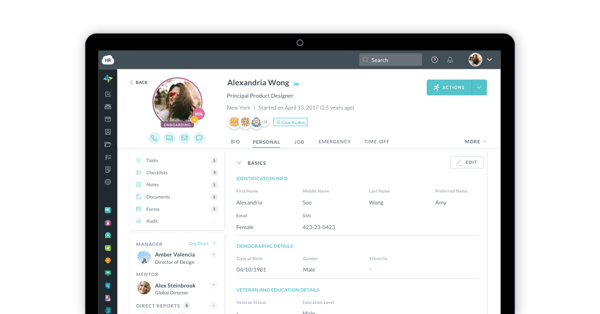
#2: Focus on employee engagement
We all know employee engagement is important, both for the worker and the business itself. For example, research has shown that the teams with a high level of engagement demonstrated 21% higher profitability than those with lower levels for employee engagement.
However, a drop in remote employees’ engagement (along with morale, productivity, and even retention) may occur if HR teams don’t focus on it. Engaging all workers--no matter where they work--is important to make them feel informed, valued, and part of the larger team.
Related resource: To learn even more about managing remote teams and keeping employees working at home highly engaged, download our eBook, “A Better Way to Communicate, Engage, Recognize and Reward Remote Teams” now.
HR solutions, such as employee communications platforms, can be an effective way to help HR teams connect with remote teams. For example, these solutions can:
-
Give them fast, easy access to critical information
-
Use mobile apps to give them the same information using their mobile device
-
Enable remote teams to communicate using email, chat, calling, or video calls
-
Let users post pictures, videos, GIFs, and more to make collaboration fun
-
Let any worker recognize a peer’s hard work or efforts, and earn points for gifts
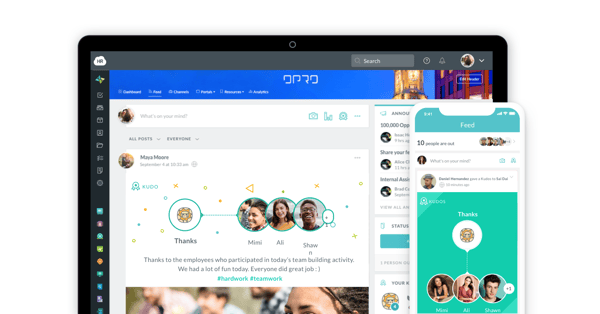
#3: Improve remote workforce communications
According to Forbes, employees spend approximately 2.5 hours a day reading, writing, and responding to emails--not ideal use of their time. Additionally, research has shown that poor communication now costs companies a total of $37 billion each and every year. The situation--and the challenge--only become worse when attempting to communicate with remote teams.
Modern HR solutions now offer a better way to communicate with remote teams, all in one platform. For example, our Workmates platform gives each employee a centralized, personalized newsfeed and group channels, so they will always receive the information they need. Or, if they have any questions, they can instantly connect to a manager or team member using chat, email, text, or call. You could also engage in remote team-building games.
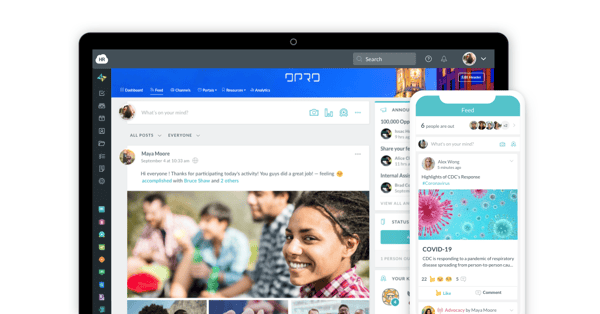
#4. Training and development
Did you know that 67% of remote employees wish they had more access to work-related training? Unfortunately, the COVID-19 crisis has only made this situation worse.
Sharing information and improving the skills of remote workers not only helps them do their jobs well but it also contributes to personal and professional development. HR teams can provide remote employees with access to training articles, videos, online courses, mentoring opportunities, and more. This can all be delivered as part of a performance management solution, or with an integration to a learning management tool.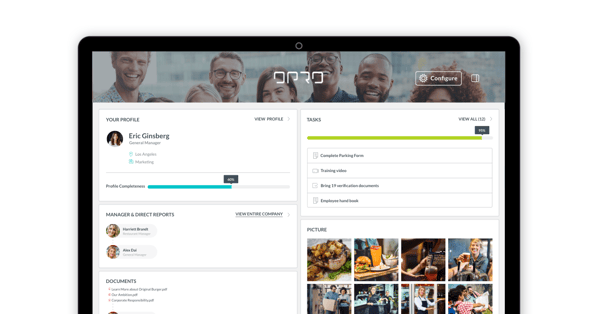
#5: Transform your culture
Sometimes it’s hard to connect with remote employees and make them understand, and feel like they’re part of, your company culture. Today, effective employee communication and engagement platforms can give all employees access to all the information they need. For example, these solutions include content management systems (CMS), employee advocacy information, and even recognition and rewards capabilities. All of this helps any company weave remote workers into their culture, and even better, transform it into culture focused on excellence.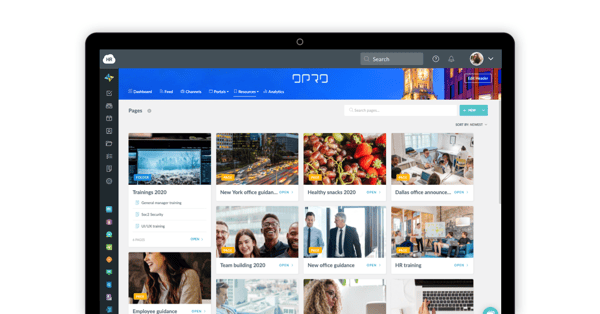
#6: Provide access to information
Research shows that remote workers spend 19% more time searching for information they need or otherwise attempting to navigate access issues. Again, this is not ideal use of their time.
One way to overcome this challenge is through the use of a mobile app. The benefit is to give remote workers fast, easy access to all the information they need, yet deliver it in a mobile app that is identical to what they would expect to find using desktop-based software. This way, employees working from home can access the CMS, their own customized content channels, HR records, employee directories, and more.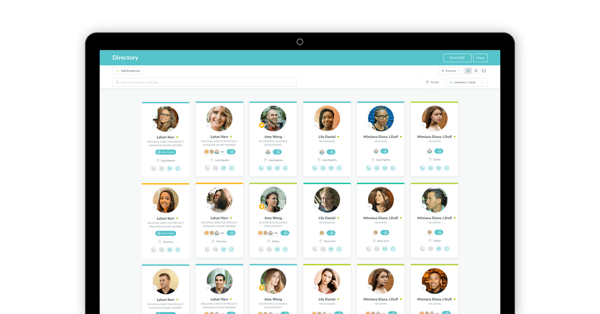
Implement a winning strategy to manage remote teams
Managing remote teams is now the new normal, even beyond the COVID-19 crisis. However, HR teams may still face a number of challenges as they attempt to hire, onboard, attract, and retain remote employees.
Today, innovative HR teams are embracing HR software, especially remote onboarding and employee engagement platforms to improve the way they connect, communicate, and collaborate with remote teams.
To learn more, download our eBook “A Better Way to Communicate, Engage, Recognize and Reward Remote Teams” today!
About author:
Alexey Kutsenko is the Head of the Marketing and Employer Brand department of DDI Development company. He is passionate about HR processes in the company as far as they are cornerstones of the company’s general success.
Keep Reading
Balancing Technology and the Human Touch in Employee Engagement
Companies are taking employee engagement very seriously because it is one of the ways of
Building Strong Teams: The Power of Team Bonding Exercises
Never overestimate the power of collaboration as a core element of effective team
